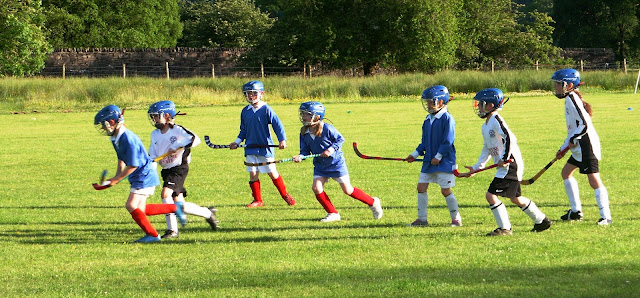But what makes a good shinty player - or a good sports player in general?
 |
| Start 'em young - is that the answer? |
Over the years I have known many good shinty players who were skilled at a whole range of sports, from golf to football to squash, badminton and many other activities. My assumption has always been that there is a tendency for these people to be good at sport because of some innate ability - natural talent.
These guys seemed to have great hand-eye co-ordination, which might be no surprise given that they were experienced shinty players. More than that, though, they seemed to have balance in their movement that might be described as an athleticism.
What made them this way?
I have heard people say that kids must start playing shinty at a very young age if they are ever going to look the part. Certainly, when you see some players on the pitch who might have only started shinty at the age of fourteen/fifteen or older - there can be a clumsiness or lack of polish in their play. But this is not always the case, so it cannot be the whole story.
What about practice? Growing up, I recall playing shinty or football at the drop of a hat, and shinty practices, though supposed to be once a week, often happened just when the notion took us.
Practices were full-blooded, with young players matching up against older guys, and no holds barred. Fights occasionally broke out, because we wanted to win. There was not a lot scientific about it, but we were all the better for it. Fitter and battle-ready.
There is a theory that anyone can achieve elite level at any activity just by sufficient practice over a long enough period.
People lead busy lives, but I see players nowadays who turn up on a Saturday after little or no practice during the week - and expect to play shinty properly. It doesn't work that way. Hitting and hand-eye co-ordination ends up being affected, and the player ends up letting down himself and the team.
Can a player be a born sportsman? Certainly, some people can be better designed to play sport; just as some are more academically able than others, certain folk are better at sport than others simply by the way they're put together, in my opinion. Spectating at a game recently, I commented about how well a particular player was performing and how consistently he had been performing all season. His uncle, hearing this on the touchline, remarked - "aye, he should be good - he comes from a long line of shinty players."
I could see his point - but again this is far from the whole story, even if it is a factor at all.
Opposition also has a role to play. Any sportsman plays (or should play) to win. To be victorious you need to be better than your opponent. Or luckier. But the point is that all you have to do is to be better than the team in front of you. Therefore, you play as well as you have to.
The better the opposition, the better you need to perform, so if you are regularly meeting good teams, your standard must improve to beat them. Players and teams improve, or lose.
Coaching and guidance by the right people plays a large part in bringing on players at all ages. If you learn the right things at the right age, it becomes second nature.
I've also heard the theory that people need to be working in physically demanding occupations, perhaps as farmers, tradesmen, foresters etc before they can be good, hard shinty players.
Not sure about this, because I've seen some pretty decent office workers on the shinty field, but again I can see the logic behind this - you may be naturally fitter, stronger and be used to hardship if you work in a physically-demanding job.
Recipe for a good shinty player? It seems to be a blend of being built for sport, with reasonable co-ordination; starting the game at an age that suits you, but in general the younger the better; playing decent opposition regularly enough; Good coaching and teaching; along with large dollops of commitment and practice.
To me, the last of these is the most important ingredient. Without commitment and plenty of practice, other players and teams who do spend time honing their skills will walk right over you.
What do you reckon?
On the shinty-field no social distinctions have ever obtained; from the chief to the lowest clansman each and all have vied in generous contention. ``On the turf, as under the turf, all men are equal.''
ReplyDeleteCamanachd calls for gifts physical and mental, of no mean order. Naturally it is no pastime for weaklings or degenerates; nor is it an exercise wherein the slow-witted or dullards will be found to shine. It makes demands on stamina, on soundness of wind and limb, on brain as well as muscle, on prowess, on manliness and courage, for which in few other games will a parallel be found...
A finished caman-wielder must, therefore, be a first-class athlete. Ability to deal lightning strokes on the ball at so many angles on the ground, in the air, whilst speeding over the turf, as well as whilst stationary; the free play of each and every muscle; the easy poise of the body on fleet yet steady feet these are some of the qualities that one looks for in a first-class player, and these are the qualities which make such a one a picture of force and strength, but also of perfect grace and carriage.''
Rev J. Ninian MacDonald O.S.B